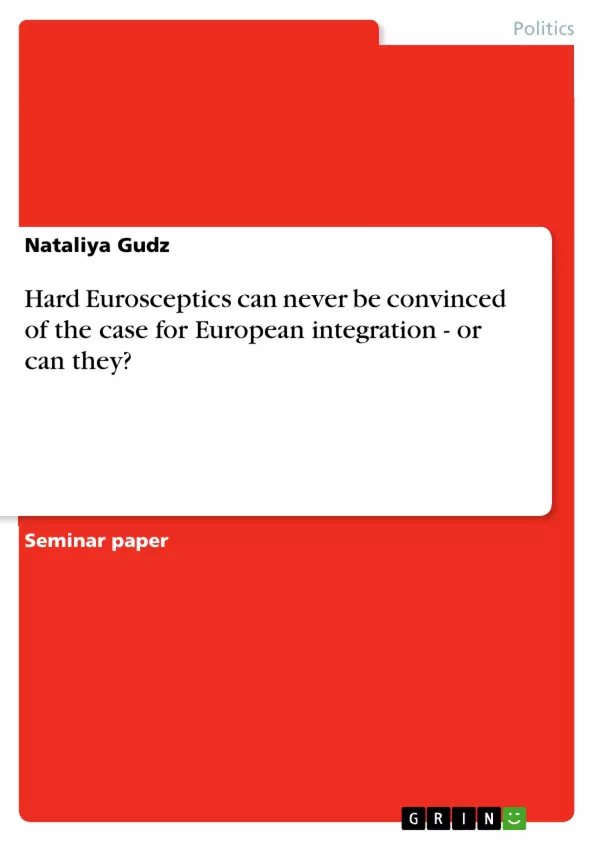Signed fifty years ago, the Treaty of Rome proclaimed an “ever closer union” by “establishing a common market and progressive approximation of the economic policies of member states” . This approximation had, however, a negative side effect –opposition to market integration, and after the sequence of enlargements – ardent resistance to any further European integration. Moreover, since the Maastricht Treaty, Eurosceptics have exploited a new battleground: ‘defence of national community’ in response to the erosion of national sovereignty and to the heightened job insecurity caused by market unification and liberalization process.
As enlargement process was taking its course, Euroscepticism grew into a potent feature of the political landscape across the EU, by not only shaking confidence in the process of further enlargement, but also ‘provoking several attempts to re-theorize the process of European integration’ . Thus, for example, ‘soft eurosceptics’ (definition proposed by Paul Taggart and Aleks Szczerbiak ) opposed to the “EU’s current or future planned trajectory based on the future extension of competencies” , whereas the main objective of their ‘hard counterparts’ was “tantamount to being de facto opposed to EU membership” .
In this paper we’ll try to analyse a phenomenon of hard Euroscepticism in the European Union by presenting Danish and British cases. We’ll demonstrate that sometimes hard Eurosceptic parties can be convinced of the case for European integration, despite their ardent anti-EU positions.
Inhaltsverzeichnis (Table of Contents)
- I. Introduction
- II. Eurosceptics yesterday and today: changes and stability
- 2.1. Nordic countries: Denmark
- 2.2. Britain
Zielsetzung und Themenschwerpunkte (Objectives and Key Themes)
This paper analyzes the phenomenon of hard Euroscepticism in the European Union by presenting Danish and British cases. The main goal is to demonstrate that even hard Eurosceptic parties can be convinced of the case for European integration, despite their strong anti-EU positions.
- The emergence and evolution of Euroscepticism in the EU
- The impact of national identity and sovereignty on Eurosceptic sentiment
- The role of economic interests in shaping Eurosceptic attitudes
- Case studies of Denmark and Britain, examining their Eurosceptic movements
- The potential for convincing hard Eurosceptics of the value of European integration
Zusammenfassung der Kapitel (Chapter Summaries)
The Introduction defines Euroscepticism and its evolution in the EU, highlighting the different types of Eurosceptics and the key factors that contribute to their rise. It also outlines the focus of the paper on hard Euroscepticism and its analysis through the lens of Danish and British cases.
The second chapter explores the historical context of Euroscepticism in the Nordic countries and Britain. It examines the roots of Euroscepticism in both regions, particularly emphasizing the issues of national identity, sovereignty, and economic interests. This section focuses on the specific case of Denmark, highlighting its historical resistance to European integration, while discussing the influence of economic benefits and the changing attitudes towards EU membership. It also presents the Danish case of the June Movement, a single-issue movement that emerged in response to the Danish membership in the EC.
The chapter then turns its attention to Britain, emphasizing its historical perspective of exceptionalism and its reluctance to give up sovereignty. It explores the connection between British exceptionalism and the ‘Nordic Model' and the ‘Sonderfall Schweiz'. The chapter concludes with a discussion of Britain's overseas orientation and the influence of its colonial past on its relationship with Europe.
Schlüsselwörter (Keywords)
The main keywords and focus topics of this text include Euroscepticism, European integration, national identity, sovereignty, economic interests, Denmark, Britain, Nordic Model, Sonderfall Schweiz, exceptionalism, and the Treaty of Rome.
Frequently Asked Questions
What is "hard Euroscepticism"?
Hard Euroscepticism refers to a principled opposition to the EU and European integration, often manifesting as a desire for a country to withdraw from membership entirely.
Can hard Eurosceptics ever be convinced of European integration?
The paper argues that despite strong anti-EU positions, some parties can be convinced of the case for integration, often due to economic benefits or changing political landscapes.
How does Euroscepticism differ in Denmark and Britain?
While both share concerns over sovereignty, Danish Euroscepticism is often linked to the "Nordic Model," whereas British Euroscepticism is rooted in historical exceptionalism and its colonial past.
What role does national identity play in anti-EU sentiment?
Eurosceptics often view European integration as an erosion of national sovereignty and a threat to the unique identity and traditional values of their home country.
What was the "June Movement" in Denmark?
It was a prominent single-issue movement that emerged in response to Danish membership in the European Community, focusing on resisting further integration.
- Citar trabajo
- Nataliya Gudz (Autor), 2007, Hard Eurosceptics can never be convinced of the case for European integration - or can they?, Múnich, GRIN Verlag, https://www.grin.com/document/116371



